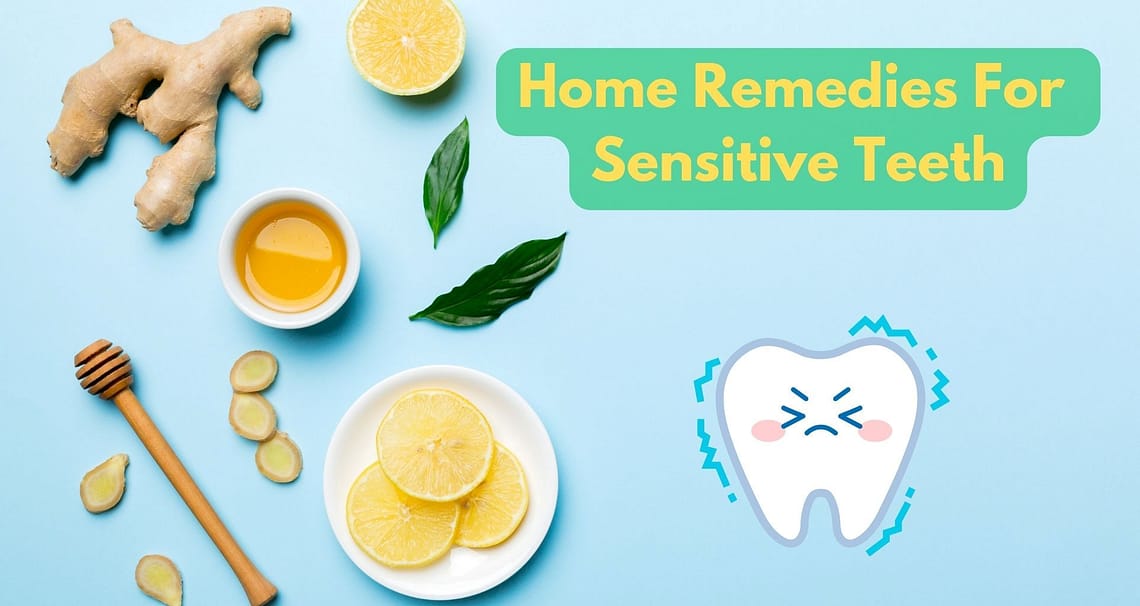Are you tired of dealing with the discomfort of sensitive teeth? Look no further! In this article, we will explore various home remedies that can help alleviate the pain and sensitivity associated with sensitive teeth.
From simple changes in your dental hygiene routine to natural remedies you can find in your pantry, we’ve got you covered. So say goodbye to the agony of sensitive teeth and embrace a pain-free smile with these effective and easy-to-implement home remedies. Don’t wait any longer, let’s get started!
Preventive Measures
Maintaining Proper Oral Hygiene:
One of the most crucial steps in preventing and managing tooth sensitivity is practicing good oral hygiene. Brush your teeth twice a day using a soft-bristled toothbrush and fluoride toothpaste. Be sure to clean all surfaces of your teeth and along the gumline. Additionally, don’t forget to floss daily to remove any food particles and plaque that may accumulate between your teeth.
Using a Soft-Bristled Toothbrush:
Opt for a toothbrush with soft bristles to prevent further enamel erosion and gum recession. Hard-bristled toothbrushes can cause unnecessary abrasion to the teeth, leading to increased sensitivity. Remember to replace your toothbrush every three to four months or when the bristles start to fray.
Using Desensitizing Toothpaste:
Consider using a desensitizing toothpaste specially formulated for sensitive teeth. These toothpastes contain ingredients such as potassium nitrate or strontium chloride, which help to block the nerve signals responsible for tooth sensitivity. Regular use of desensitizing toothpaste can provide relief and protect your teeth from sensitivity.
Avoiding Acidic Foods and Beverages:
Acidic foods and beverages can erode tooth enamel, exposing the sensitive dentin underneath. Limit your consumption of acidic foods such as citrus fruits, tomatoes, and carbonated drinks. If you do consume acidic substances, rinse your mouth with water afterward to help neutralize the acidity.
Limiting Sugar Intake:
Excessive sugar consumption can contribute to tooth decay and enamel erosion, leading to increased tooth sensitivity. Limit your intake of sugary foods and drinks, and opt for healthier alternatives such as fresh fruits and vegetables. Remember to brush your teeth or rinse your mouth after consuming sugary substances to minimize the effects on your teeth.
Natural Remedies
Oil Pulling:
Oil pulling involves swishing a tablespoon of coconut or sesame oil in your mouth for 15-20 minutes. This ancient Ayurvedic practice is believed to reduce bacteria in the mouth and promote oral health. Oil pulling may help alleviate tooth sensitivity by improving overall oral hygiene. However, it is important to note that oil pulling should not substitute regular brushing and flossing.
Saltwater Rinse:
A saltwater rinse can help alleviate tooth sensitivity and reduce inflammation in the gums. Dissolve half a teaspoon of salt in warm water and swish it around your mouth for 30 seconds before spitting it out. This simple remedy can provide temporary relief from tooth sensitivity.
Clove Oil:
Clove oil has been used for centuries as a natural remedy for toothache and sensitivity. It contains eugenol, a natural anesthetic and antiseptic compound. Apply a few drops of clove oil to a cotton ball and gently rub it on the affected tooth for temporary relief. However, be cautious as excessive use of clove oil can cause irritation.
Garlic Paste:
Garlic has antibacterial properties that can help reduce tooth sensitivity caused by bacterial infections. Crush a clove of garlic to form a paste and apply it to the affected tooth for a few minutes before rinsing your mouth. Avoid leaving the garlic paste on your teeth for too long to prevent irritation.
Turmeric Powder:
Turmeric possesses anti-inflammatory and antimicrobial properties that can help alleviate tooth sensitivity. Mix a teaspoon of turmeric powder with a few drops of water to form a paste. Apply the paste directly to the affected tooth and leave it on for about 10 minutes before rinsing. Repeat this remedy a few times a week for optimal results.
Guava Leaves:
Guava leaves contain compounds with anti-inflammatory and analgesic properties, making them an effective natural remedy for tooth sensitivity. Chew a fresh guava leaf to release its juices, or boil some guava leaves in water to make a mouth rinse. Use this remedy twice daily for a few weeks to experience relief from tooth sensitivity.
Homeopathic Remedies

Source: Pexels.com
Hypericum perforatum:
Hypericum perforatum, also known as St. John’s wort, is a homeopathic remedy often used for dental pain and nerve-related tooth sensitivity. It can be taken orally in tablet or tincture form. Follow the recommended dosage instructions provided by a qualified homeopathic practitioner.
Plantago major:
Plantago major, commonly known as plantain, is another homeopathic remedy used for tooth sensitivity. It is known for its soothing and healing properties. Plantago major can be taken orally or locally applied to the affected tooth in the form of a tincture or gel. Consult a homeopathic practitioner for proper guidance on dosage and administration.
Chamomilla:
Chamomilla is a homeopathic remedy that may help with tooth sensitivity accompanied by severe pain and irritability. It is particularly useful for sensitivity that worsens with exposure to cold air or when drinking cold beverages. Follow the recommended dosage instructions provided by a homeopathic practitioner.
Calcarea fluorica:
Calcarea fluorica, also known as calc-fluor, is a homeopathic remedy commonly used for strengthening tooth enamel and alleviating tooth sensitivity. It can be taken in tablet or liquid form. Consult a homeopathic practitioner for the appropriate dosage and duration of treatment.
Magnesia phosphorica:
Magnesia phosphorica, or mag-phos, is a homeopathic remedy that may be effective in relieving tooth sensitivity accompanied by shooting nerve pain. It can be taken orally in tablet or liquid form. Seek guidance from a homeopathic practitioner for the correct dosage and frequency of use.
Dietary Changes
Increasing Calcium and Vitamin D Intake:
Calcium and vitamin D are essential for maintaining strong teeth and bones. Incorporate calcium-rich foods such as dairy products, leafy greens, and almonds into your diet. Exposure to sunlight is also an excellent source of vitamin D.
Consuming Foods Rich in Potassium:
Potassium helps strengthen tooth enamel and reduce tooth sensitivity. Include potassium-rich foods like bananas, avocados, spinach, and sweet potatoes in your diet. These foods can contribute to better oral health and overall well-being.
Adding Green Tea to the Diet:
Green tea contains antioxidants called catechins, which have been shown to have anti-inflammatory and antimicrobial properties. Regularly drinking green tea can help reduce tooth sensitivity and promote a healthier oral environment.
Introducing Probiotics:
Probiotics, commonly found in yogurt, kefir, and fermented foods, can help improve oral health by balancing the bacteria in your mouth. The beneficial bacteria in probiotics can help fight off harmful bacteria that contribute to tooth sensitivity and tooth decay.
Avoiding Teeth-Staining Foods and Drinks:
Certain foods and drinks, such as coffee, tea, red wine, and dark-colored berries, can stain your teeth and potentially contribute to tooth sensitivity. Limit your consumption of these staining substances and drink water or rinse your mouth after consuming them to help minimize their effects.
Remember, these dietary changes should complement good oral hygiene practices and professional dental care.
Also Check: Do Teeth Whitening Strips Really Work?
Herbal Remedies
Aloe Vera Gel:
Aloe vera gel has soothing and anti-inflammatory properties that can help alleviate tooth sensitivity. Apply a small amount of natural aloe vera gel to the affected tooth and gently massage it into the gums. Leave it on for several minutes before rinsing your mouth. Repeat as needed for temporary relief.
Peppermint Tea:
Peppermint tea has a cooling effect and can help reduce tooth sensitivity caused by inflammation. Brew a cup of peppermint tea, allow it to cool, and use it as a mouth rinse. Swish the tea in your mouth for a few seconds before spitting it out. Regular use of peppermint tea can provide temporary relief.
Sage Mouthwash:
Sage has antibacterial and anti-inflammatory properties that can help soothe sensitive teeth and promote oral health. Brew a strong sage tea, allow it to cool, and use it as a mouthwash. Rinse your mouth with the sage mouthwash for 30 seconds to a minute before spitting it out. Incorporate this remedy into your daily oral hygiene routine for long-term relief.
Chamomile Tea:
Chamomile tea has natural anti-inflammatory and antibacterial properties that can help alleviate tooth sensitivity. Brew a cup of chamomile tea, cool it down, and use it as a mouth rinse. Gently swish the tea in your mouth for a minute before spitting it out. Regular use of chamomile tea as a mouth rinse can help reduce tooth sensitivity.
Eucalyptus Oil:
Eucalyptus oil has analgesic and antimicrobial properties that can provide temporary relief from tooth sensitivity. Mix a few drops of eucalyptus oil with a carrier oil, such as coconut oil, and apply it to the affected tooth using a cotton ball. Leave it on for a few minutes before rinsing your mouth. Use this remedy sparingly and avoid ingesting the oil.
While herbal remedies can offer temporary relief, it is essential to address the underlying cause of tooth sensitivity and seek professional dental care when necessary.

Alternative Therapies
Acupuncture:
Acupuncture is an ancient Chinese therapy that involves inserting thin needles into specific points on the body. It can help alleviate tooth sensitivity by promoting blood circulation and reducing inflammation. Consult a licensed acupuncturist for a personalized treatment plan.
Acupressure:
Acupressure works by applying pressure to specific points on the body to achieve therapeutic effects. Gentle pressure on certain acupressure points, such as the ones associated with the mouth and teeth, may help relieve tooth sensitivity. Learn proper acupressure techniques from a qualified practitioner.
Ayurvedic Oil Pulling:
Ayurvedic oil pulling is similar to the previously mentioned oil pulling technique but involves using specific oils, such as sesame oil or coconut oil infused with herbs. Follow the traditional Ayurvedic method of oil pulling for best results.
Homeopathic Treatments:
Homeopathic treatments for tooth sensitivity consider the individual’s overall health and symptoms. A homeopathic practitioner will prescribe remedies based on your specific case and may suggest remedies such as the ones mentioned earlier in the homeopathic remedies section. Visit a qualified homeopathist for personalized treatment.
Alternative therapies can be used as complementary approaches to traditional dental care. It’s important to consult with professionals and integrate these therapies into a comprehensive treatment plan.
Tips for Immediate Relief
Applying a Cold Compress:
If you’re experiencing sudden tooth sensitivity, applying a cold compress to the affected area can help numb the nerves and reduce inflammation. Wrap a few ice cubes in a thin cloth or use a cold pack and hold it against the outside of your cheek near the sensitive tooth.
Gently Massaging the Affected Area:
Lightly massaging the gums around the sensitive tooth with a clean finger or a warm, wet cloth can provide temporary relief by increasing blood flow and reducing sensitivity signals. Be gentle to avoid causing further irritation.
Avoiding Triggers:
Pay attention to activities or stimuli that worsen your tooth sensitivity, such as extremely hot or cold foods and beverages, acidic foods, or biting down on hard objects. Avoiding these triggers can prevent unnecessary discomfort.
Using a Toothpaste for Sensitive Teeth:
There are several over-the-counter toothpaste options specifically formulated for sensitive teeth. These toothpaste products contain desensitizing agents that can provide temporary relief and protect your teeth from sensitivity. Use the toothpaste as directed, typically brushing with it twice a day.
Using a Mouthguard for Teeth Grinding:
If tooth sensitivity is caused by teeth grinding or clenching, your dentist may recommend using a custom-fitted mouthguard. A mouthguard can help prevent further damage to your teeth and reduce sensitivity by creating a protective barrier between your upper and lower teeth.
Immediate relief measures are temporary solutions, and it is important to address the underlying cause of your tooth sensitivity for long-term relief.
Professional Treatments
Desensitizing Agents:
Your dentist may apply desensitizing agents, such as fluoride varnish or bonding agents, to the affected teeth during a dental visit. These agents help to block the transmission of pain signals and can provide significant relief from tooth sensitivity.
Fluoride Treatments:
Fluoride treatments, whether in the form of gels, rinses, or varnishes, can help strengthen tooth enamel and reduce sensitivity. Your dentist may recommend professional fluoride treatments to enhance the protection of your teeth from sensitivity.
Dental Bonding:
Dental bonding involves applying a tooth-colored resin material to the affected tooth or teeth. This procedure can help protect the exposed root surfaces and reduce tooth sensitivity.
Gum Grafting:
In cases where gum recession is causing tooth sensitivity, gum grafting surgery may be necessary. During this procedure, your dentist or periodontist will take gum tissue from another area of your mouth and graft it onto the exposed root surfaces. Gum grafting can help restore gum tissue and reduce sensitivity.
Root Canal Therapy:
In severe cases of tooth sensitivity caused by extensive tooth decay or nerve damage, root canal therapy may be the recommended treatment. This procedure involves removing the infected or damaged pulp from the tooth and sealing it to prevent further pain and sensitivity. Root canal therapy can provide long-lasting relief from tooth sensitivity.
It is crucial to consult with your dentist or dental professional to determine the most suitable professional treatment for your specific case of tooth sensitivity.
Frequently Asked Question (FAQs)
Can sensitive teeth be cured?
While tooth sensitivity can be managed and controlled, it is important to note that it may not be completely cured in all cases. The underlying causes of tooth sensitivity, such as enamel erosion or gum recession, may require ongoing maintenance and care to minimize discomfort. Following preventive measures, utilizing home remedies, making dietary changes, and seeking professional treatments can significantly alleviate tooth sensitivity.
How long does it take for home remedies to work?
The effectiveness and timeline for home remedies vary depending on the individual and the severity of the tooth sensitivity. Some individuals may experience immediate relief, while others may require consistent use of home remedies over a few weeks before noticing a significant improvement. It is essential to be patient and consistent with home remedies to achieve long-term relief.
Are there any risks associated with using home remedies?
While most home remedies for tooth sensitivity are generally safe, there are some considerations to keep in mind. It is always best to consult with a healthcare professional or dentist before trying any new home remedy, especially if you have pre-existing dental conditions or sensitivities.
When should I seek professional dental care for sensitive teeth?
A dentist will be able to evaluate the underlying cause of your sensitivity and provide appropriate diagnosis and treatment options. Additionally, if you notice any other concerning symptoms such as severe pain, swollen gums, or sudden changes in tooth color, it is essential to consult a dentist for proper evaluation.
Can tooth sensitivity occur in only one tooth?
Yes, tooth sensitivity can occur in a single tooth or multiple teeth. If you are experiencing sensitivity in only one tooth, it may indicate a specific dental issue that requires professional attention. Consulting a dentist will help determine the cause and provide appropriate treatment for the affected tooth.
Conclusion
Tooth sensitivity can be a bothersome and uncomfortable condition, but there are various preventive measures, natural remedies, dietary changes, herbal remedies, alternative therapies, and professional treatments available to manage and alleviate the discomfort.
By practicing good oral hygiene, incorporating home remedies and dietary changes into your routine, exploring alternative therapies, and seeking professional dental care when necessary, you can find relief from tooth sensitivity and promote better oral health. Remember, each individual’s experience with tooth sensitivity may vary, so it is important to consult with a dentist for a proper diagnosis and personalized treatment plan.






